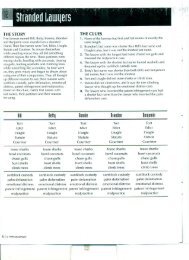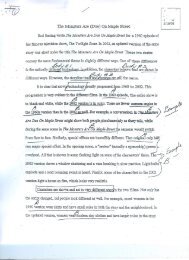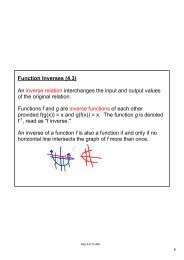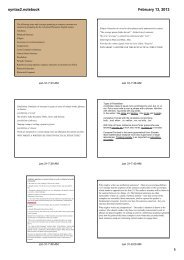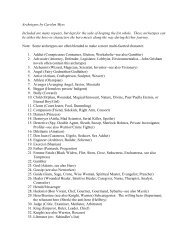Rosencrantz and Guildenstern Are Dead - Cherokee County Schools
Rosencrantz and Guildenstern Are Dead - Cherokee County Schools
Rosencrantz and Guildenstern Are Dead - Cherokee County Schools
Create successful ePaper yourself
Turn your PDF publications into a flip-book with our unique Google optimized e-Paper software.
ight, then. I don't care. I've had enough. To tell you the truth, I'm relieved,'' while <strong>Guildenstern</strong> continues to<br />
look for explanations <strong>and</strong> escape routes—"there must have been a moment ... where we could have said— no."<br />
His final words are either a continued denial of the reality of his death or an acceptance of his status as a<br />
literary character—"well, we'll know better next time."<br />
Stoppard's theme is probably best summed up by the speech that <strong>Rosencrantz</strong> makes in Act II about lying in a<br />
coffin. Quite out of the blue he says to <strong>Guildenstern</strong>, "do you ever think of yourself as actually dead, lying in a<br />
box with a lid on it?" Quite honestly <strong>and</strong> significantly, <strong>Guildenstern</strong> says "no" <strong>and</strong> <strong>Rosencrantz</strong> echoes his<br />
response. But then the usually dim-witted <strong>Rosencrantz</strong> touches on the essential problem—"one thinks of it like<br />
being alive in a box, one keeps forgetting to take into account the fact that one is dead ... which should make<br />
all the difference ... shouldn't it? I mean, you'd never know you were in a box, would you? It would be just<br />
like being asleep in a box." When human beings attempt to think about their deaths, they assume some kind of<br />
continued consciousness. Ironically, <strong>Rosencrantz</strong> demonstrates in this speech the very kind of thinking he has<br />
just categorized as "silly." After characterizing death as a kind of sleep, he associates death with a mortal<br />
dream state, complete with the possibility of waking to full consciousness <strong>and</strong> a sense of helplessness—"not<br />
that I'd like to sleep in a box, mind you, not without air." Unable to conceptualize his own death he refuses to<br />
fully accept that "for all the compasses in the world, there's only one direction, <strong>and</strong> time is its only measure."<br />
Style<br />
Comedy<br />
One of the most distinguishing features of Stoppard's <strong>Rosencrantz</strong> <strong>and</strong> <strong>Guildenstern</strong> <strong>Are</strong> <strong>Dead</strong> is the way it<br />
moves in <strong>and</strong> out of the plot of Shakespeare's Hamlet <strong>and</strong> changes tone as it does so. While Shakespeare's<br />
play has many moments of rich humor, it is basically serious <strong>and</strong> tragic, while Stoppard's treatment of the<br />
Shakespearean story is distinctly comic, even farcical.<br />
Much of Stoppard's comedy comes, then, from the implicit contrast with Shakespearean solemnity. As the<br />
most famous tragedy of the most respected playwright in the history of the world, Hamlet conjures up an<br />
image of high seriousness, but when we meet Stoppard's courtiers at the beginning of his play they are<br />
casually flipping coins <strong>and</strong> speaking in colloquial, informal prose rather than Shakespearean verse. The<br />
rag-tag tragedians add even more contrast with Shakespearean seriousness, especially when they descend in<br />
their financial desperation to the suggestion of a pornographic exploitation of little Alfred. However, when the<br />
two courtiers are sucked into the Shakespearean action <strong>and</strong> must mingle with characters speaking<br />
Shakespearean blank verse, they begin speaking the same way <strong>and</strong> the sharp contrast with their informal<br />
speech creates a comical effect both going <strong>and</strong> coming. Their inability to escape the Hamlet plot is comic, as<br />
is what appears to be a posturing attempt to fit into it when they can't escape. Finally, they are comic when<br />
they deflate again to their non-heroic stature after the Hamlet characters disappear. In their first entry into the<br />
Shakespearean world, Stoppard indicates that the two courtiers are "adjusting their clothing" before they<br />
speak, <strong>and</strong> as they use the lines given them in Shakespeare's play, their inflated style is comic because it<br />
seems postured <strong>and</strong> implies desperate ineptitute. Then, back in their Stoppardian world, they are once again<br />
comically unheroic, as <strong>Rosencrantz</strong> whines, "I want to go home," <strong>and</strong> <strong>Guildenstern</strong> puts on his comical<br />
bravado, unconvincingly attempting to appear in control.<br />
But if <strong>Rosencrantz</strong> <strong>and</strong> <strong>Guildenstern</strong> are comically foolish because they seem overwhelmed by the power of<br />
the Shakespearean world, they are also comically noble because their ordinary presence seems eventually to<br />
deflate that Shakespearean high seriousness. It is as if their ordinary, prosaic quality begins to acquire a<br />
nobility of its own, <strong>and</strong> in contrast the Shakespearean characters eventually begin to sound exaggerated, even<br />
a little silly. This impression finds its culmination in Act III, when Hamlet is discovered lounging under a<br />
gaudily striped umbrella, reduced to something not quite classically Shakespearean. There is thus in<br />
Stoppard's play a kind of comic victory for the underdog, perhaps most clearly expressed at the beginning of<br />
Style 6





